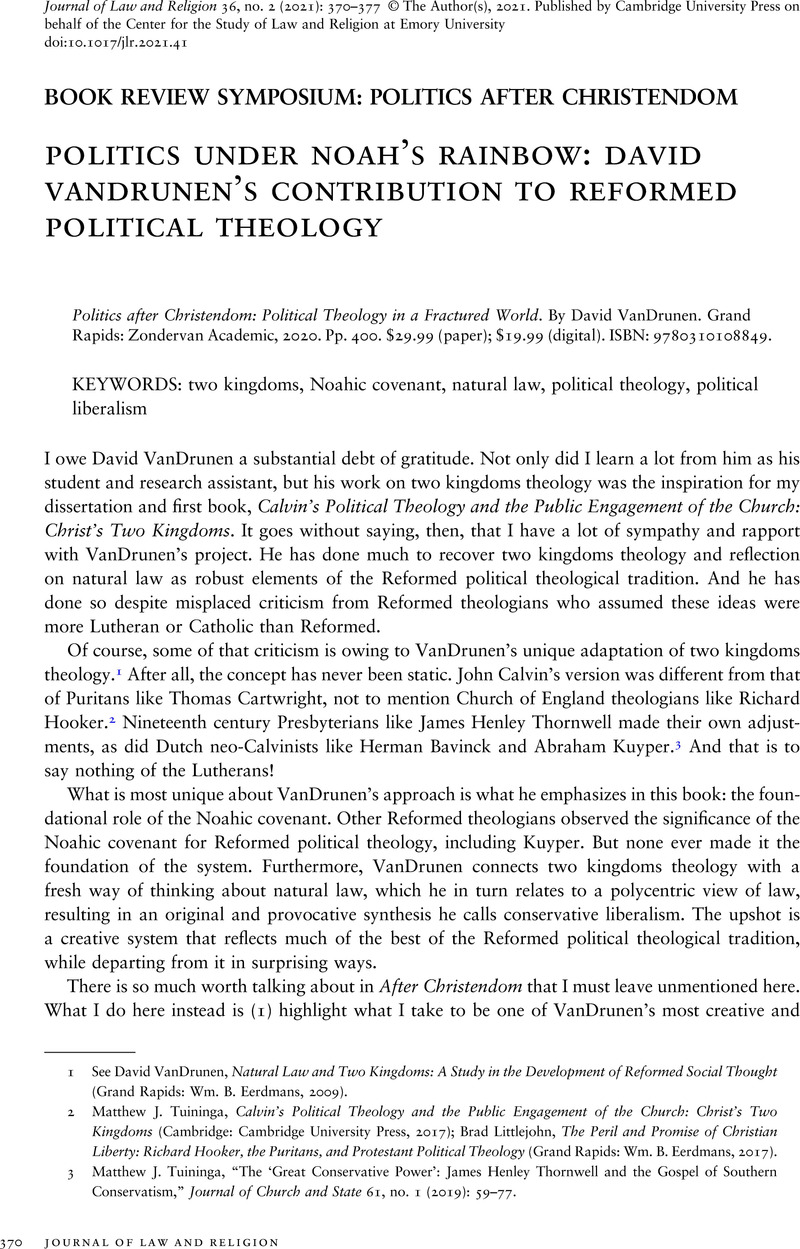No CrossRef data available.
Published online by Cambridge University Press: 01 September 2021

1 See VanDrunen, David, Natural Law and Two Kingdoms: A Study in the Development of Reformed Social Thought (Grand Rapids: Wm. B. Eerdmans, 2009)Google Scholar.
2 Tuininga, Matthew J., Calvin's Political Theology and the Public Engagement of the Church: Christ's Two Kingdoms (Cambridge: Cambridge University Press, 2017)CrossRefGoogle Scholar; Littlejohn, Brad, The Peril and Promise of Christian Liberty: Richard Hooker, the Puritans, and Protestant Political Theology (Grand Rapids: Wm. B. Eerdmans, 2017)Google Scholar.
3 Tuininga, Matthew J., “The ‘Great Conservative Power’: James Henley Thornwell and the Gospel of Southern Conservatism,” Journal of Church and State 61, no. 1 (2019): 59–77CrossRefGoogle Scholar.
4 See Tuininga, Calvin's Political Theology, 99–107.
5 See Tuininga, Calvin's Political Theology, 321–78.
6 See Tuininga, Matthew J., “Abraham Kuyper and the Social Order: Principles for Christian Liberalism,” Journal of Markets & Morality 23, no. 2 (2020): 337–61Google Scholar.
7 Coleman, Janet, “Property and Poverty,” in The Cambridge History of Medieval Political Thought: c. 350—c.1450, ed. Burns, J. H. (Cambridge: Cambridge University Press, 1988), 607–48, at 618–19Google Scholar.
8 Thomas Aquinas, Summa Theologica, trans. Fathers of the English Dominican Province, 3 vols. (New York: Benziger Brothers, 1947–1948), 2:2.2, q. 66, a. 7.
9 John Calvin, Commentary on Isaiah 58: 1–14, in Calvin's Commentaries, vol. 8, Isaiah 33–66, trans. William Pringle (Grand Rapids: Baker Book House, 2003), 221–43, at 233–34.
10 Tuininga, Matthew J., “Good News for the Poor: An Analysis of Calvin's Concept of Poor Relief and the Diaconate in Light of His Two Kingdoms Paradigm,” Calvin Theological Journal 49, no. 2 (2014): 221–47Google Scholar.
11 Kuyper, Abraham, “The Social Question and the Christian Religion,” in On Business and Economics, ed. Heslam, Peter S. (Bellingham: Lexham Press, 2021), 169–230, at 217Google Scholar.
12 Abraham Kuyper, “Christ and the Needy,” in On Charity and Justice, ed. Matthew J. Tuininga (Bellingham: Lexham Press, forthcoming).
13 Kuyper, “You Shall Not Steal,” in On Business and Economics, 31–82, at 63.
14 Ironically, Richard Hooker, who had his own version of two kingdoms theology, accused Presbyterian two kingdoms theologians of imagining that scripture regulates Christian life more precisely than it does. Brad Littlejohn has explored this controversy, which he relates to his concerns about VanDrunen's earlier work. See Littlejohn, The Peril and Promise of Christian Liberty.